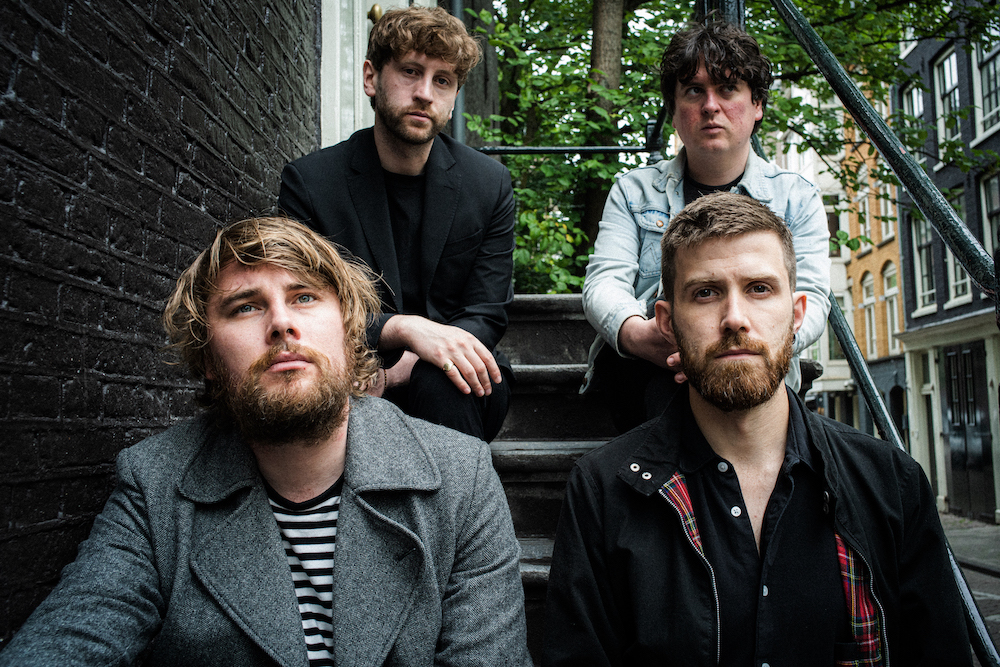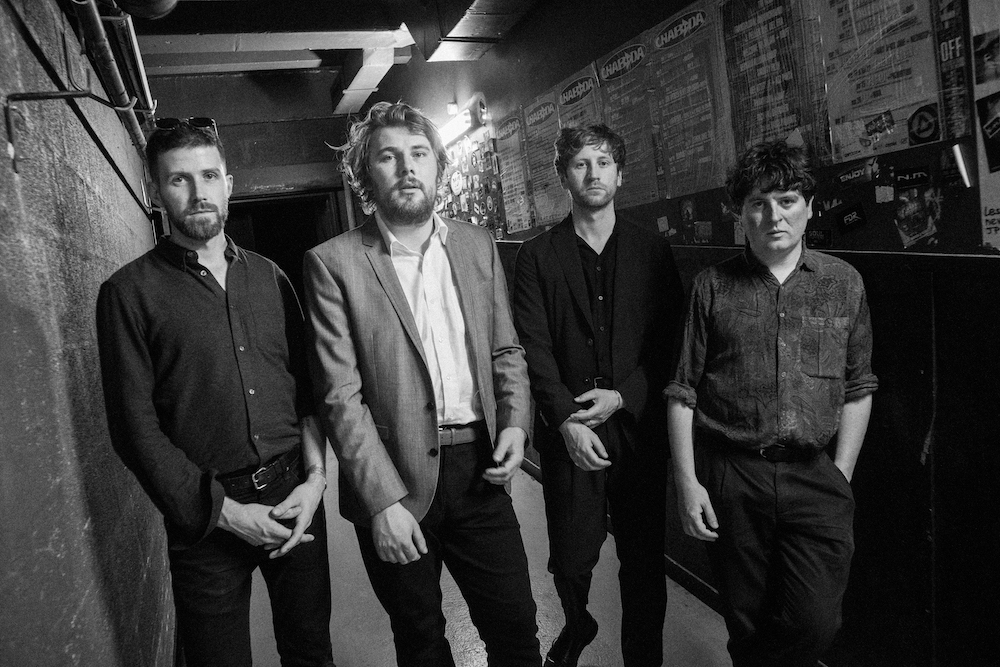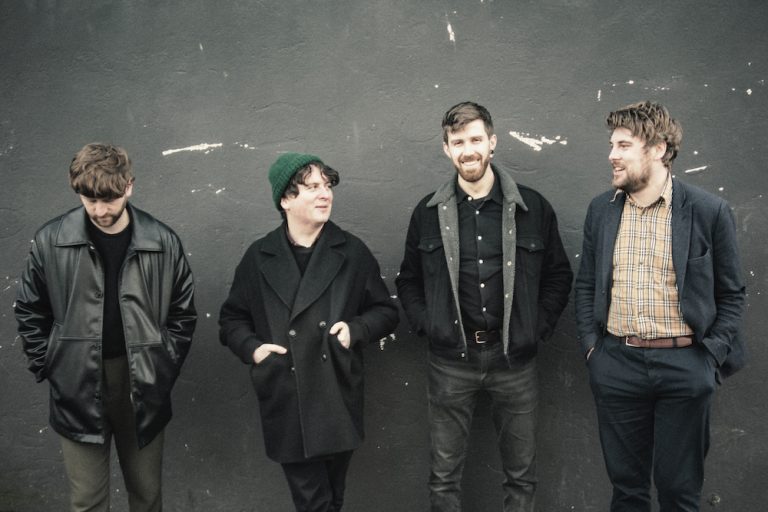Tomorrow, Dublin experimental noise rockers Gilla Band will release their new album Most Normal. While it makes good on its title by being the quartet’s most accessible to date, ‘normal’ is certainly a relative term – just as with their previous entires, Most Normal is not for the faint of heart or the tender of ear. The hooks are hefty and the instrumentation colossal, while the production from bassist Daniel Fox fashions it all into a maelstrom of sound that moves around and through you as you listen.
Vocalist Dara Kiely is at his dextrous best, stretching the boundaries of his voice and lyricism, proffering hallucinogenic imagery in cortex-tickling inflections. It’s also a showcase for Alan Duggan’s guitar playing, especially as he gets to show off several new weapons in his arsenal, bringing new tones to the band’s unfathomable rock formation. Behind all this is Adam Faulkner’s centrifugal-force-like drumming, sturdy and domineering, holding the towering sound together and guiding Gilla Band into their deepest and densest sonic territories yet.
With so much going on in Most Normal, we thought we’d get to learn a little more about it from the band themselves, and Dara and Alan were kind enough to oblige. Check out our Q&A below, after enjoying the spectacular single “Backwash”.
The Talkies started in the midst of a literal panic attack but Most Normal starts in even more terrifying fashion as we feel like we and Dara are getting eaten alive by some kind of manic machine. Do you intend to make more uncompromising intros every time? At what point in the process does the first track come along?
Alan: I’ve always enjoyed intro tracks on albums. I think they can really set the tone or mood of a record. “The Gum” felt like a good way to open this one. We figured it was one of the weirder more abrasive ones.
In the writing process we’ve never sat down and tried to write an intro. When we have a bigger selection of songs, the intro becomes a bit more obvious.
“The Gum” (and others) once again show your propensity for techno-like tracks. How much influence does techno have over your music? Influence aside, are you big fans of techno?
Alan: Yeah techno has always been an influence in the band. Myself and Adam would probably listen to it more than Daniel or Dara, but you still hear it come across in the bass lines I think. We don’t necessarily sit around listening to techno together or go to DJ sets anymore, but it’s always been an influence.
How different would this album have been if you had been able to road test the material?
Dara: Quite different. We chipped away at it. Recorded little bits and pieces from our practice space and home demos. I started to use Logic which gifted me an opportunity to write melodies and lyrics in a comfortable manner.
The record, perhaps more than the previous two, seems like a showcase for Adam’s drumming ability, resulting in a very physical album. Does his style influence the way the songs are built up, or vice versa?
Dara: I think he’s great! He’s always building things, putting up shelves and exploring new ways to approach his style of play. He plays to the style of the track and constantly challenges himself. Very inspiring and joy to create with.
The refrain from “Eight Fivers” of “spent all my money on shit clothes” is an instant classic – what are the shittest clothes you’ve ever bought?
Dara: I bought a T-SHIRT from a place called Jack and Jones in Dublin when I was 14. It said ‘Dog Skiing’ on it and had a picture of a stick man figure, I guess, Skiing off a Dog. I still have no idea what that means but I got slagged a lot for it.
The sequencing of the record is very tight, leaving hardly any silences. Is this to keep people locked in to the piece? To further the dream-like feeling? To make it act more like a DJ mix?
Alan: Yeah I think its to keep people locked in. The Talkies was the first time we really thought about transitions and sequencing. We wanted to do that again with this record. It felt good to have quick jolts between tracks without much rest. Earl Sweatshirt’s Some Rap Songs was definitely an influence for that.

You have some extended sections of uncomfortably high-pitched sounds. Are you just trying to provoke listeners into madness?
Alan: Ah no. I have had tinnitus for most of my life so it sounds kinda normal to me. I always liked how sound design is used in films, where there are moments of high-pitched sounds like this after intense moments. Seemed like a fun thing to try. Also I feel that feedback or noise in records too often sounds normal or familiar. It can be hard to make it sound abrasive or surprising. That high pitch thing sounded more uncomfortable. Listening to that very loud in our rehearsal space was a fun experience. But my dog didn’t like it.
Is this whole album just a soundtrack to going insane?
Dara: No, not really. The first record certainly is and the second is the comedown from manic behaviour. Most Normal for me anyway is a happy record. The tone is lighter than the other two.
It sounds like there are more instruments used in this album, is that so? Any particularly exciting additions?
Alan: A big addition for me was using a lap steel guitar. I got a 1937 Rickenbacker Model B-6. I think it was the second model of electric guitar ever made. It sounds incredible. Immediately sounds like old Bugs Bunny cartoons or Santo & Johnny. It also has the name “BUD” engraved into the back of it. I love it.
We also used a bit of organ and a lot of noisey synth boxes. One we used quite a bit was from a company called Electro Lobotomy. Really amazing sounds from it.
“I hate Ryanair” is a sentiment that many of us can empathise with, but what in particular made you put that line into “Capgras”?
Dara: There’s an amazing track by Ray Price called “Night Life”. In the track while the whole song is playing, he just starts introducing the album. We tried to do this over a hardcore-ish punk-y track. I must have done about 40 different attempts of what exactly to say over all the noise. “I hate Ryanair” came from a demo I was working on. It seemed to fit the tone alright.
On some songs, especially on the second half of the album,you’re screaming and scraping your voice more than ever, Dara – are there any vocalists of the more metal, hardcore or screamo ilk that inspire you?
Dara: I’m not into metal, hardcore or screamo at all really. My favourite shout actually comes from “Memories” by Leonard Cohen. The end of the track just releases genuine tension that comes out of nowhere and still gives me chills.
The ending breakdown and heavy beats on “Almost Soon” are insane – how did you get that sound?
Alan: Thank you. That’s just the three instruments and Dara. The bass has some nice low end EQ on it I think. Drums are tight sounding and we doubled tracked the guitars. Nothing too wild going on there but we do have Dara doing some sexy groans.
Tell me about the repeated closing line on the album – “I get inevitable depression when I do nothing”.
Dara: It’s a bit more direct than the rest of the stuff. It felt a bit naked writing it. Sadly, a true story.
Gilla Band’s new album Most Normal is out tomorrow, October 7, via Rough Trade (pre-order/save). You can find them on Facebook, Twitter and Instagram.


